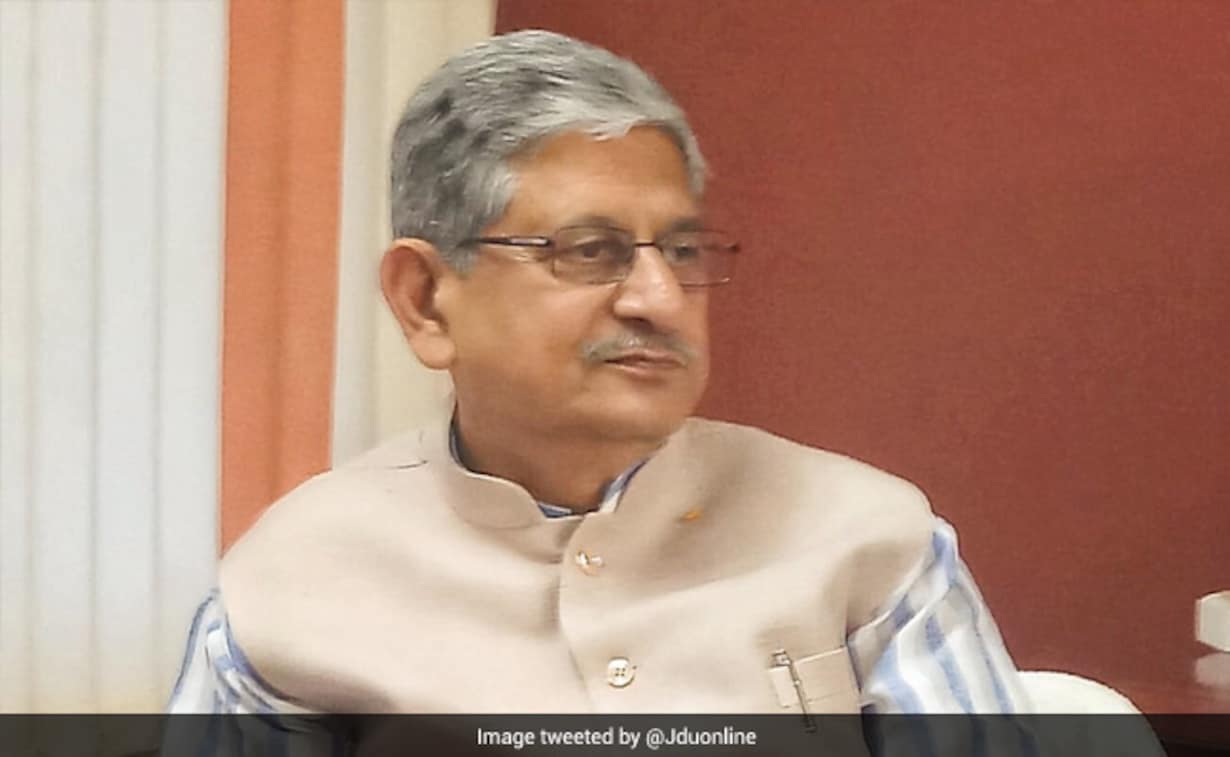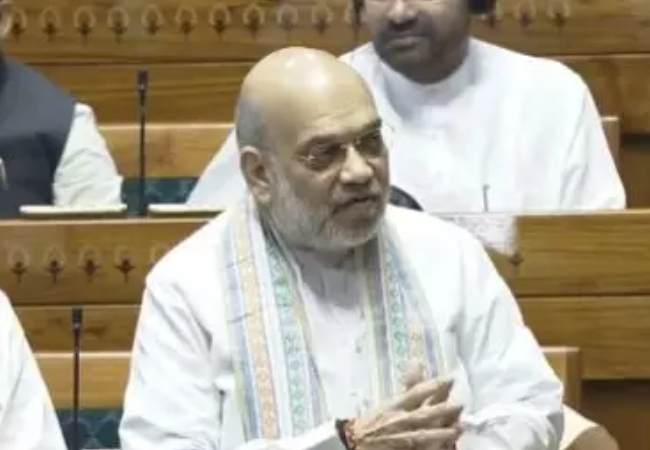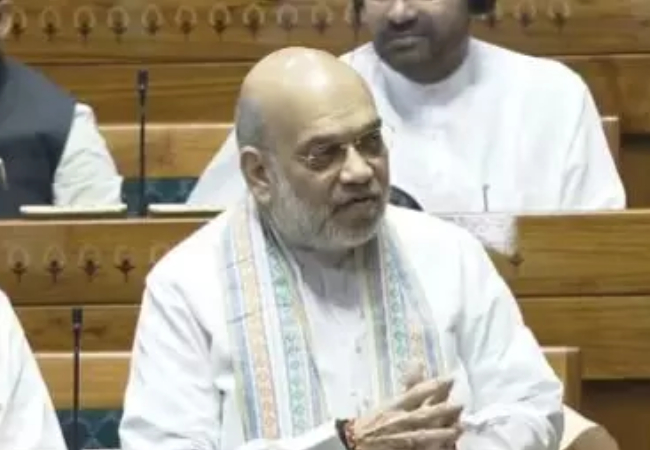Patna, Sep 17: JD(U) president Rajiv Ranjan Singh alias Lalan on Saturday alleged that political strategist-turned-politician Prashant Kishor was "working for" the BJP, as part of its "conspiracies" to find a firm foothold in Bihar.
Rubbishing Kishor's claim of having turned down an "offer" from Chief Minister Nitish Kumar, the party's de facto leader, Lalan asserted that the poll campaign manager was "not a political worker but a businessman" who relied on "marketing" tactics.
"We know Prashant Kishor has been working for the BJP for some time. One agent of the BJP was recently caught during magistrate checking," remarked the JD(U) chief, in an obvious reference to former national president RCP Singh.
"The BJP is relying on conspiracies in Bihar. First it used RCP Singh and now it is using Prashant Kishor. But we are vigilant. We will not allow these designs to succeed," Lalan said.
The JD(U) president's remarks come barely a few days after a meeting between Kumar and Kishor after which the latter claimed to have engaged in some plain-speak with the Bihar CM, having told him that prohibition, one of his most feted moves, was a complete failure and needed to be reviewed.
Kishor, who has launched a campaign 'Jan Suraaj' as part of which he will be embarking on a 3,500 km-long state-wide 'padayatra' next month, had also claimed to have turned down a "specified" offer from Kumar who, he believes, has run out of steam.
Lalan claimed, "It was Prashant Kishor who wanted to meet Nitish Kumar after the new political situation emerged in Bihar. He spoke to the CM who asked him to first have a word with the party president. So he came to meet me in New Delhi."
"I told him that his return to the party could be considered if he agreed to abide by party discipline. Thereafter he secured an appointment with the CM who agreed to meet him and gave an appointment. But, as part of his marketing strategy, he told the media that he has been called to the CM's residence but he will not go," claimed the JD(U) president.
"Later, after Pavan Varma met Nitish Kumar, the former also had a word with Kishor whom he knows. Kishor again expressed the wish to meet the CM and they met. But why will anybody give him any offer? Who is he?" said Lalan.
Notably, Kishor shot to fame in 2014 when his company IPAC handled the spectacularly successful campaign of Prime Minister Narendra Modi, who was then the Gujarat CM and the BJP's Prime Ministerial candidate for Lok Sabha polls.
Kumar, whose party was drubbed, hired Kishor a year later when assembly polls were held in Bihar. Kumar's alliance with arch rival Lalu Prasad and Congress trounced the BJP despite an intensive campaign by the PM.
Kishor was subsequently appointed as an advisor to the Bihar CM, a post of cabinet minister rank, though he continued to work in professional capacity for other political figures.
In 2018, Kumar, who was then the JD(U) national president, inducted Kishor into the party and elevated him to the post of national vice president within weeks. However, Kishor's outspokenness against CAA-NPR-NRC led to his expulsion from the party in 2020, which was then an NDA ally.
Soon afterwards, Kishor had launched a campaign called "Baat Bihar Ki" which ran into an intellectual property rights legal dispute and was, subsequently, shelved. Kishor, who maintains that he gave up the previous project because of the COVID-19 pandemic, went on to manage West Bengal Chief Minister Mamata Banerjee's successful campaign in 2021 assembly polls.
After a long drawn out, but unsuccessful, negotiation with the Congress which he had promised to revamp if he joined as a full-time member and got a free hand, Kishor returned to Bihar earlier this year to launch 'Jan Suraaj' which he promises to develop into a "better political alternative" for the state.
Let the Truth be known. If you read VB and like VB, please be a VB Supporter and Help us deliver the Truth to one and all.
New Delhi (PTI): The ruling NDA on Wednesday launched a feisty defence of the Waqf (Amendment) Bill in the Lok Sabha amid the opposition's charge that it was unconstitutional and targeted Muslims, as Home Minister Amit Shah asserted that the government had no intention of interfering in their religious matters and was solely driven by the aim of transparent administration of Waqf properties.
Shah's intervention came during the day-long debate that witnessed a fierce exchange between the two sides, with Congress Deputy Leader Gaurav Gogoi alleging that the bill was an attempt to attack the basic structure of the Constitution, defame minorities, disenfranchise them and divide the society.
Minorities Affairs Minister Kiren Rijiju in his opening remarks rejected the allegation that the proposed law was an interference in the constitutionally guaranteed freedom in religious affairs.
The bill has nothing to do with religion, but deals only with properties, he said tabling the Bill, which was examined and redrafted by a joint committee of Parliament.
"The government is not going to interfere in any religious institution. The changes made in the Waqf law by the UPA government gave it overriding effect over other statutes, hence the new amendments were required," Rijiju said amid noisy opposition protests.
"You (opposition) tried to mislead the people on issues which are not part of the Waqf Bill," she said to the opposition.
Both ministers asserted that the proposed reforms would ensure the welfare of poor Muslims and women.
The BJP was bolstered by a show of support from its key allies like the TDP, JD(U), Shiv Sena and Lok Janshakti Party (Ram Vilas), while the INDIA bloc put up a united show in opposing the bill.
Samajwadi Party chief Akhilesh Yadav claimed that the bill is a BJP's ploy for polarisation following its reverses in the Lok Sabha polls, alleging that it will send a wrong message to the world denting the country's secular image.
The bill will prove to be a "waterloo" for the BJP as some of its allies might be claiming to support the bill but inside they are not happy about the development, he said.
"Bringing Waqf Bill is the BJP's political game, it is a new form of their communal politics. The BJP wants to appease those supporters who are now distancing themselves from the party because of its policies.
After most of the leading opposition leaders had spoken, Shah launched a stout defence of the bill and rejected the most common criticism that the appointment of non-Muslims in the Waqf council and boards violated a community's right to manage its own affairs.
He also warned against instigating Muslims against the law, noting that an opposition MP had said that the minorities will not accept this. "It is the law of the Indian government and Parliament. Everyone will have to accept it."
The bill will become a law after it is notified following its passage in both Lok Sabha and Rajya Sabha.
Shah said the government is not going to have any say in the matters of Waqf, endowments made by Muslims for religiously charitable and pious purposes, adding that the council and boards are aimed at the management of the properties to ensure that they are used in line with the stated aims behind their donation.
He accused the opposition of "fear-mongering" over the bill's provisions, saying this is how they raised a vote bank.
He accused the Congress-led UPA government of effecting many amendments in the Waqf law in 2013 for its appeasement politics, saying these changes made the Act "extreme". Had those changes not been made, the government might not have brought the bill, he added.
He cited a host of instances from across the country about vast properties being claimed by different state Waqf boards, with a section of people involved in their management making personal gains while doing little for the community. The new law will catch such people and throw them out, he added.
"This money is of the poor Muslims not for a few moneybags," he said, citing the meagre income of Rs 163 crore from Waqf properties.
Citing speeches of several opposition leaders, including RJD president Lalu Prasad Yadav, in 2013, he said even they had noted the rampant property grab in the name of Waqf law.
Gogoi argued that the bill had not been adequately discussed with minority representatives.
"In 2023, four meetings of the Minority Commission were held, and yet, there was no mention of the need for a Waqf amendment bill. I ask the government - was this bill drafted by the Minority Affairs Ministry or some other department?"
The opposition MP also raised concerns over Clause 3, which defines individuals practising Islam.
"Minorities are now being forced to prove their religious identity with certificates. Tomorrow, will people from other faiths also have to do this? This is against Article 26 of the Constitution," he said.
BJP's Anurag Thakur said, "This bill is not about Hindu versus Muslim, this is law versus lawlessness, Constitution versus corruption."





